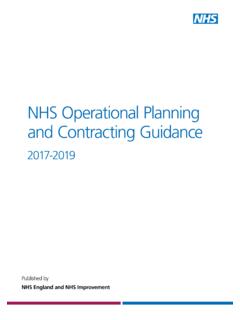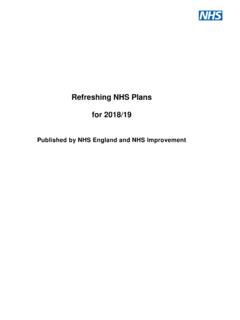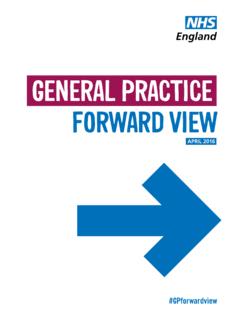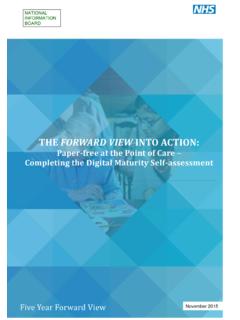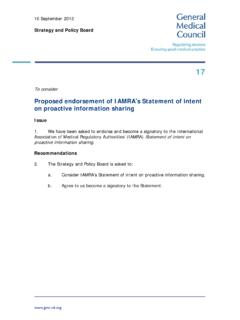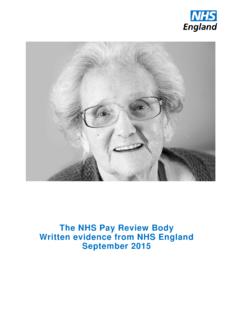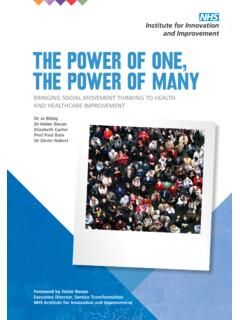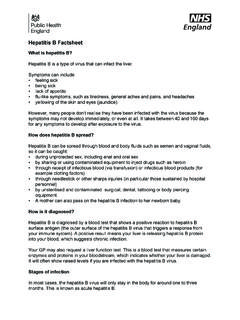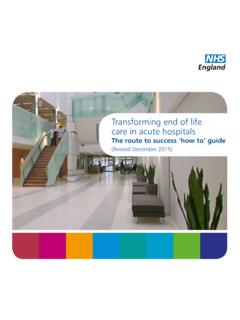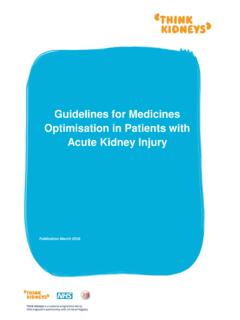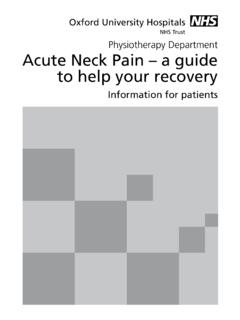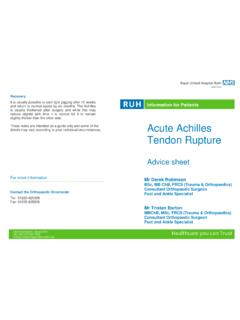Transcription of Transformation of seven day clinical ... - NHS England
1 Transformation of seven day clinical pharmacy services in acute hospitals September 2016 | 2 P a g e NHS England INFORMATION READER BOXD irectorateMedicalOperations and InformationSpecialised CommissioningNursingTrans. & Corp. StrategyFinancePublications Gateway Reference:5764 Document PurposeDocument NameAuthorPublication DateTarget AudienceAdditional Circulation ListDescriptionCross ReferenceAction RequiredTiming / Deadlines(if applicable) Transformation of seven day clinical pharmacy services in acute hospitalsSuperseded Docs(if applicable)Contact Details for further informationDocument Status0 This is a controlled document. Whilst this document may be printed, the electronic version posted on the intranet is the controlled copy. Any printed copies of this document are not controlled. As a controlled document, this document should not be saved onto local or network drives but should always be accessed from the intranet. ReportLondon, SE1 Office of the Chief Pharmaceutical Officer, Medical DirectorateSkipton House80 London Road N/AN/AOffice of the Chief Pharmaceutical Officer, Medical Directorate05 September 2016 CCG clinical Leaders, CCG Accountable Officers, Foundation Trust CEs , Medical Directors, Directors of Nursing, Local Authority CEs, NHS Trust Board Chairs, NHS England Regional Directors, Allied Health Professionals, Communications Leads, Emergency Care Leads, NHS Trust CEs, Pharmacists and Pharmacy Technicians, Pharmacy Support Staff#VALUE!
2 N/AN/AN/A | 3 P a g e Transformation of seven day clinical pharmacy services in acute hospitals Version number: 1 First published: 05/09/2016 Updated: Prepared by: NHS England , Office of the Chief Professional Officers (Chief Pharmaceutical Officer), Medical Directorate Classification: OFFICIAL Promoting equality and addressing health inequalities are at the heart of NHS England s values. Throughout the development of the policies and processes cited in this document, we have: Given due regard to the need to eliminate discrimination, harassment and victimisation, to advance equality of opportunity, and to foster good relations between people who share a relevant protected characteristic (as cited under the Equality Act 2010) and those who do not share it; and Given regard to the need to reduce inequalities between patients in access to, and outcomes from healthcare services and to ensure services are provided in an integrated way where this might reduce health inequalities This information can be made available in alternative formats, such as easy read or large print, and may be available in alternative languages, upon request.
3 Please contact 0300 311 22 33 or email | 4 P a g e Foreword clinical pharmacy skills in the NHS are currently in high demand. This isn t surprising in the context of polypharmacy, suboptimal medicines use, medication error, preventable medication related admissions to hospitals, increasing antimicrobial resistance and huge and rising therapeutic costs. The knowledge and skills of the pharmacist are central to optimising medicines use to create better outcomes for patients, better value for the taxpayer and more headroom to introduce new treatments. But a rewarding career and outlook for pharmacy professionals comes with its challenges. In common with other healthcare professions, there is notable variability in the consistency with which pharmaceutical services are provided and medicines optimisation implemented. Lord Carter s final report on NHS productivity and efficiency, published in February 2016, identified significant variations in practice, availability and deployment of hospital pharmacy services across the country.
4 The report supported further implementation of clinical pharmacy to optimise value and outcomes from medicines, but the report also highlighted that this must done in a manner which transforms the hospital pharmacy service as a whole, creating significant efficiencies. We know that the limited availability of patient-facing hospital pharmacy services outside of normal hours can lead to patients missing doses of important medicines, lack of support for junior medical and nursing staff, low levels of medicines reconciliation, delayed transfers of care and poor support for patients at hospital discharge. Therefore, we welcome this comprehensive report and constructive recommendations which, for the first time, set out a clear and compelling vision for seven day hospital pharmacy services. We are heartened by the number of observations and case studies that describe what some organisations have already achieved and have begun to help define what good looks like.
5 Transformation of hospital pharmacy services should build on this good practice whilst aligning with broader system wide Transformation . We know that doing more of the same will not be enough to facilitate innovative changes in the ways that services are delivered seven days a week for patients. Professor Sir Bruce Keogh National Medical Director NHS England Dr Keith Ridge CBE Chief Pharmaceutical Officer Dr Kathy McLean Medical Director NHS Improvement | 5 P a g e Contents 1. Executive summary .. 6 2. Why is this report necessary? .. 9 3. clinical standards .. 11 4. Why are seven day clinical pharmacy services in hospitals important? .. 12 5. What could be done to transform clinical pharmacy into a seven day service? .. 18 6. The challenges affecting progress .. 21 7. Planning for delivery of seven day hospital pharmacy services .. 24 8. How national/local organisations and individuals should support delivery .. 35 | 6 P a g e 1.
6 Executive summary Hospital pharmacy services should operate more efficiently and safely. Through the optimal use of medicines, technology and workforce, alongside collaboration amongst providers, unnecessary variation in services can be avoided. This will deliver value for money for the taxpayer and good clinical outcomes for all patients seven days a weekWhy is this report necessary? This report has been written for clinicians, managers and national bodies to promote the benefits and importance for all patients and the NHS of seven day hospital clinical pharmacy services. The focus of this report is on patient facing clinical pharmacy services, as this is where the greatest opportunity lies to improve the quality of pharmaceutical care for patients. This report will support delivery of the 10 seven day clinical standards as set out by the NHS Services, seven Days a Week Forum and the Hospital Pharmacy Transformation Programme (HPTP) - as set out by Lord Carter s recent report.
7 clinical standards The NHS Five Year Forward View outlines the commitment of the NHS to ensure that hospital patients have access to seven day services where this makes a clinical difference to outcomes. The 10 seven day clinical standards define what seven day services in hospitals should achieve, four of which were prioritised. By 2020, 100 per-cent of the population should have access to hospital services which meet these four priority clinical standards. Hospital clinical pharmacy services can significantly support this delivery. Why are seven day clinical pharmacy services in hospitals important? To enhance patient experience by giving patients the opportunity to discuss medication related aspects of their care and supporting progress through their care pathways. To reduce unwarranted variation in the quality of care by embedding the principles of medicines optimisation into routine practice every day of the week. To improve clinical efficiency and patient safety through increased deployment of clinical pharmacy staff to focus on optimal use of medicines and delivering seven day health and care services.
8 To address the clinical workforce demand in hospitals, by providing a potential solution to the challenges in the recruitment of medical and nursing staff, such as the optimal use of pharmacist prescribers. | 7 P a g e What could be done to transform clinical pharmacy into a seven day service? Incremental changes to current services will not achieve the ambition for a high quality, affordable and sustainable seven day hospital clinical pharmacy service. Hospitals are more likely to improve efficiency and productivity if they transform services in order to meet the following needs: a greater focus on all patient facing medicines optimisation roles across the patient pathway; optimising pharmacy workforce capability to ensure an appropriate skill-mix of generalist and specialist pharmacist prescribers, clinical pharmacists and pharmacy technicians in local teams; implementation and the optimal use of technology, including electronic prescribing and medicines administration systems (EPMA); an ability to appropriately and consistently identify high risk patients and; collaborative working to share and consolidate non- clinical infrastructure services between hospital and primary care pharmacy services.
9 The challenges affecting progress A range of factors have resulted in slow progress towards delivering seven day clinical pharmacy services in some areas. These include on-going historical service challenges, particularly around the supply of medicines, a lack of service investment, workforce capability issues and limited digital maturity. Planning for delivery of seven day hospital pharmacy services There is no single one size fits all approach and hospitals will need to consider a combination of different approaches to improve the quality of care patients receive seven days a week. This will include the following: Recognising the Hospital Pharmacy Transformation Programme (HPTP) plans alongside Sustainable and Transformation Plans (STPs) and Local Digital Roadmaps (LDRs) as the primary levers for delivery. A pragmatic and incremental approach to redesign clinical pharmacy services that will involve the optimal use of technology, workforce and infrastructure.
10 Providing targeted clinical services to high risk patients. Better integration of clinical pharmacy professionals into the multi-professional team. Demonstrating system-wide professional leadership to achieve Transformation and seven day services at the scale required. Learning and sharing practice from hospitals that have made progress, examples of which are shared in the full report. | 8 P a g e Summary of how national/ local organisations and individuals should support delivery 1 NHS Improvement and NHS England should establish an appropriately resourced clinical Pharmacy Reference Group, as part of the seven day services programme governance arrangements. 2 NHS Improvement and the Chief Pharmaceutical Officer for England should ensure all HPTP plans submitted in April 2017 include robust plans on how they propose to implement seven day clinical pharmacy services. 3 The Royal Pharmaceutical Society should develop professional guidance to support pharmacists through all stages of their career and advanced clinical practice.
